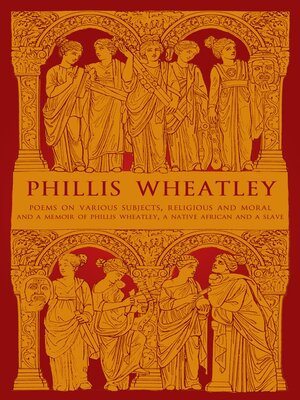Phillis Wheatley
ebook ∣ Poems on Various Subjects, Religious and Moral and A Memoir of Phillis Wheatley, a Native African and a Slave
By Phillis Wheatley

Sign up to save your library
With an OverDrive account, you can save your favorite libraries for at-a-glance information about availability. Find out more about OverDrive accounts.
Find this title in Libby, the library reading app by OverDrive.



Search for a digital library with this title
Title found at these libraries:
| Library Name | Distance |
|---|---|
| Loading... |
In 1773, Poems on Various Subjects, Religious and Moral became the first book of poetry by an African-American author to be published. At the tender age of seven, Phillis had been brought to Massachusetts as a slave and sold to the well-to-do Wheatley family. There, she threw herself into education, and soon she was devouring the classics and writing verse with whatever she had to hand – odes in chalk on the walls of the house. Once her talent became known, there was uproar, and in 1772 she was interrogated by a panel of 'the most respectable characters in Boston' and forced to defend the ownership of her own words, since many believed that it was an impossible that she, an African-American slave, could write poetry of such high quality. As related in the 1834 memoir by an outspoken proponent of antislavery, B.B. Thatcher, also included in this volume, the road to publication was not straight, and while it became clear that such a volume could not be published in America at the time, Phillis was recommended to a London publisher, who brought out the book – albeit with an attestation as to her authorship, as well as a 'letter from her master' and a short preface asking the reader's indulgence. This edition includes the attestation, the 'letter from her master' and notes from the original publishers as an appendix, so that the twenty-first-century reader can discover Phillis Wheatley as she should have been read – as a poet, not property.







